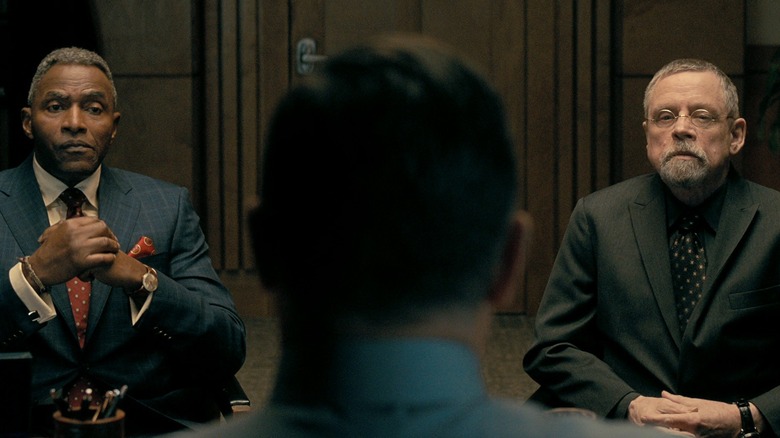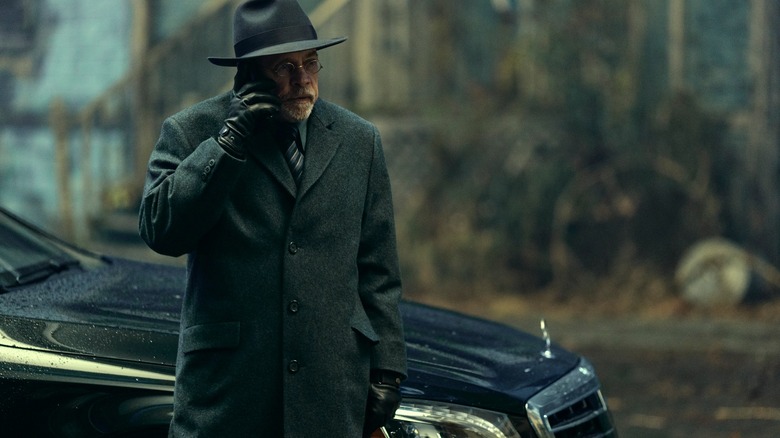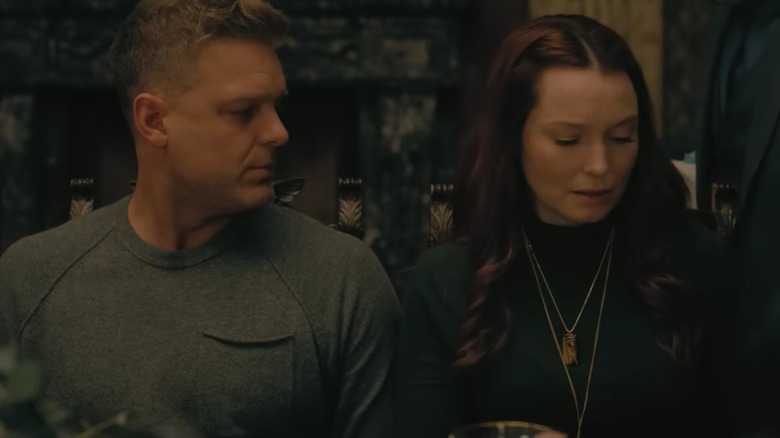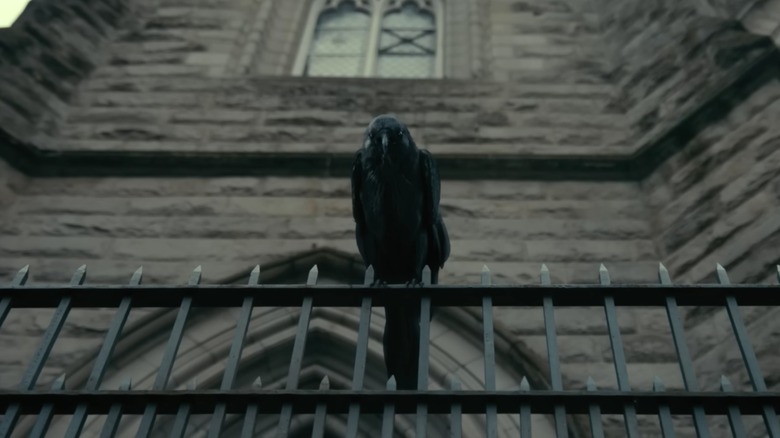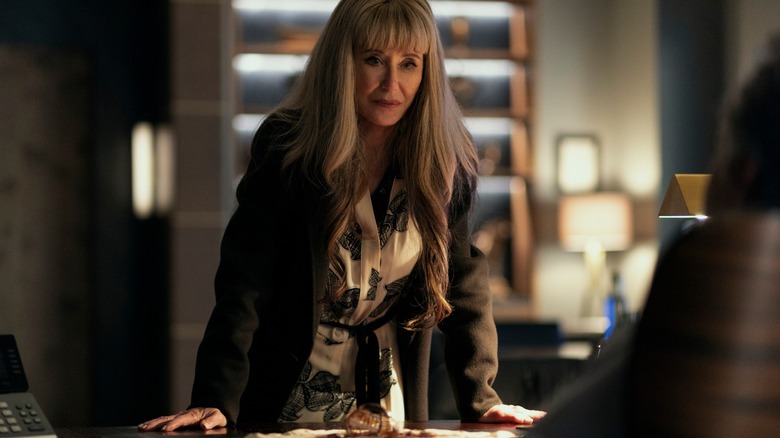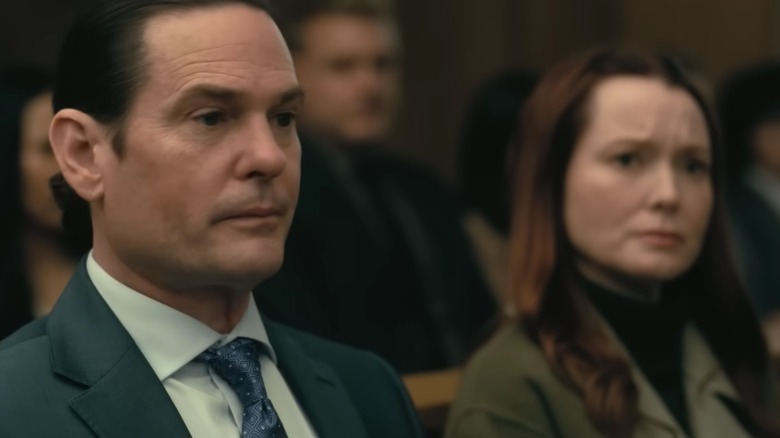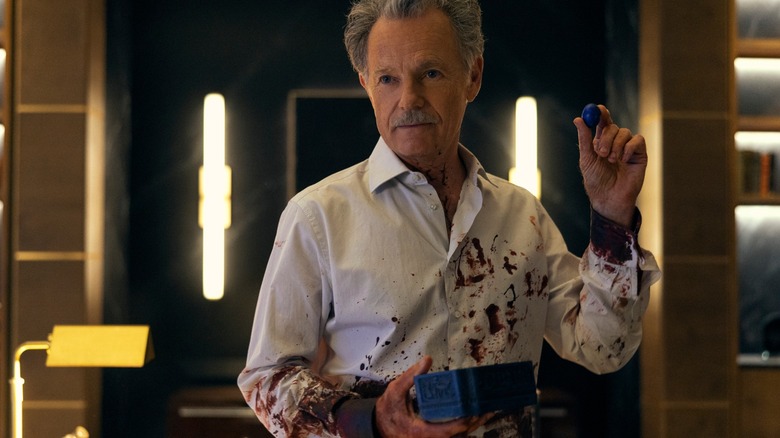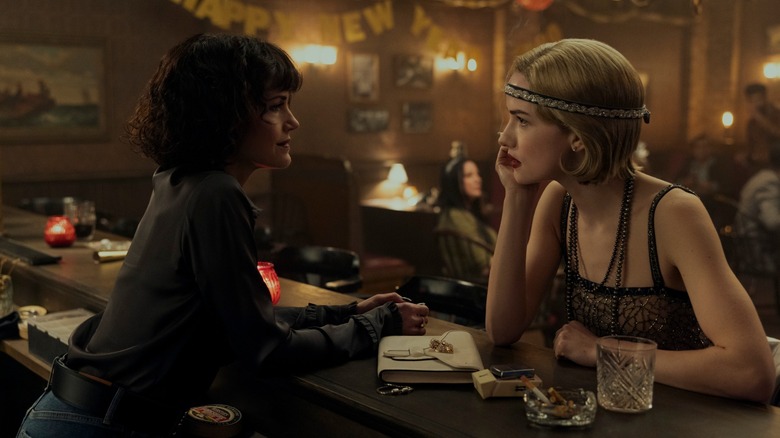All The Edgar Allan Poe References In The Fall Of The House Of Usher Explained
This post contains spoilers for "The Fall of the House of Usher."
Edgar Allan Poe's "The Fall of the House of Usher" may only be a few thousand words long, but in Mike Flanagan's sprawling and savage new Netflix series, it takes a whole lot longer for the members of House Usher to reach their ultimate fate. Across the series' eight episodes, members of the wealthy pharmaceutical family die disturbing and complex deaths at the hands of a curse patriarch Roderick Usher (Bruce Greenwood) and his sister Madeline (Mary McDonnell) agreed to years ago. In a clever twist, though, each death ties back to a famous (or lesser-known) story or poem from the famously bleak author, all of them reimagined for a modern audience.
Flanagan's "The Fall of the House of Usher" is entertaining whether or not you recognize the stories behind its goriest moments, but the filmmaker also crams so many Poe references into this world that it's worth unpacking them in order to appreciate the attention to detail. Here's every Poe reference we've found in the new series.
The Masque of the Red Death
The first death sequence in "The Fall of the House of Usher" is also its gnarliest — and perhaps coolest. When youngest child Prospero (Sauriyan Sapkota) becomes obsessed with the idea of throwing an elaborate party to prove himself a successful part of the Usher family, his plans backfire when industrial waste hidden by the family company ends up scalding the guests to death. The juxtaposition of the brutal and disgusting mass death with the swanky orgy that had been beginning moments earlier make for the series' most grim and unforgettable episode.
Prospero's party is interrupted by a woman in red (Carla Gugino) wearing a skull mask, one who seems to know exactly what's about to happen. That figure is taken directly from the Poe story that gives the episode its title, 1842's "The Masque of the Red Death." This story, too, features a powerful man named Prospero whose exclusive party is crashed by a lady in a corpse mask who leads to their deaths. In the case of Poe's story, though, Prospero throws the party in the midst of a plague — he's basically a one-percenter breaking quarantine rules. The plague itself causes horrific symptoms including bleeding from the pores, and the woman who arrives at the party is meant to be the illness personified. After Prospero confronts her, he dies, and his party guests also end up slain — by the Red Death they could've avoided if they'd just stayed home.
The Purloined Letter
"The Fall of the House of Usher" includes an engrossing frame narrative led by Carl Lumbly's C. Auguste Dupin. Though it takes a while for viewers to get the full picture of Dupin's relationship with the Usher family, it eventually becomes clear that he was a fraud investigator who caught on to some shady tactics being employed at the company where a young Roderick Usher (Zach Gilford) worked. The main evidence involved papers with forged signatures, and Roderick's tactical double-crossing of Dupin would ultimately lead to his making major moves in the company and earning his fortune.
Poe's 1844 detective story "The Purloined Letter" features a hero named C. Auguste Dupin as well, a figure who appears in three Poe stories. This Dupin is an amateur investigator who, in this case, got involved in a blackmail scheme involving a letter. The letter itself is the key piece of evidence that eventually leads Dupin to solve the case, though justice isn't clearly served at the end of the story. While Roderick used paperwork with his name on it to leverage power over his boss, the villain in "The Purloined Letter" is blackmailing none other than the queen.
The Murders in the Rue Morgue
The third episode of the series takes its name from an 1841 short story that features Detective Dupin solving a rather upsetting double murder case. A mother and daughter — the latter's name is Camille, just like Kate Siegel's character in the show — are found slain in their home. The pair have been subjected to grievous injuries, with Camille stuffed into a chimney and her mother decapitated. The story has a clever and surprising twist, but if you know it, you likely weren't surprised by Camille's death in the new series.
At the end of "The Murders in the Rue Morgue," Dupin discovers that the crimes were actually committed by a runaway orangutan, one that started off friendly but was triggered into a fit of rage by the womens' screams. PR fixer Camille faces a similar fate, as she ends up ripped apart by a monkey — which freakishly merges with Gugino's ubiquitous character — after sneaking into her sister's laboratory to dig up some dirt. In both cases, the monkey is the killer but not the bad guy; the poor fella just wanted to be left alone.
The Black Cat
One of the series' most darkly comedic tales involves the death of Napoleon (Rahul Kohli), who quickly goes from the coolest of the Usher siblings to the most despicable when he apparently kills his boyfriend's cat, Pluto, in his sleep and attempts to cover up the crime — by replacing the cat with an uncannily similar cat that he loathes just as much. The new cat basically torments Napoleon for killing the other cat earlier, and once the Usher brother has been scratched up and well and truly driven mad, he ends up leaping over his balcony ledge in an endless pursuit of the rascal. Yikes.
Poe's 1843 story "The Black Cat" also features a cat that haunts the man who abused it. This story is really dark, and while I'll spare you the details of the narrator's animal abuse, it's worth noting that he does something to his cat that the cat in Flanagan's show does to Napoleon — scratching out his eye, as if in revenge. After killing his cat and replacing it with an identical one, the narrator also kills his wife, and police ultimately find her corpse because Pluto 2.0 is alive in the walls of the house, meowing up a storm. It's all pretty messed up.
The Tell-Tale Heart
The guilty conscience Poe describes in "The Black Cat" sounds a lot like the one he explores in "The Tell-Tale Heart," a famous story that was published the same year. In Poe's story, a mentally unwell man commits a murder and hides the body beneath his floorboards, but soon becomes plagued by the sound of the victim's beating heart. The heartbeat starts off as a simple ringing sound but it eventually grows unbearable, leading the narrator to reveal his crime to the authorities.
This story has been interpreted on screen plenty of times over the years, but Flanagan's series finds a new, grotesque take on it with the story of Victorine (T'Nia Miller) and her girlfriend Alessandra (Paola Núñez). In the Netflix series' version of events, scientist Victorine is on the verge of beginning unethical and almost certainly deadly human trials for a new mechanical heart mesh. She's also been covering up the deaths of lab animals, something that has Alessandra, a surgeon at the company, ill at ease. Partway through the episode, Victorine starts hearing a strange squeaking sound that seems to drive her mad, but it's only at episode's end that we (and Roderick) discover it's coming from the heart mesh, which she installed in poor, long-dead Alessandra's chest once she accidentally killed her during an argument. Don't let the FDA hear about that.
The Narrative of Arthur Gordon Pym of Nantucket and Dream-Land
Though he doesn't get his own episode, scary family fixer Arthur Pym (Mark Hamill) is still a walking Poe reference like the rest of the cast. Pym's name is taken from Poe's one and only finished novel, the 1838 mariner's tale "The Narrative of Arthur Gordon Pym of Nantucket." The story follows Pym as he secretly joins an excursion on a whaling ship called the Grampus. This pre-"Moby Dick" saga at sea gets pretty trippy, but it also includes more straightforward adventure elements than most of Poe's other works.
Roderick Usher mentions Pym's own time at sea in the series, telling Dupin he was part of the Transglobe Expedition that circumnavigated the globe entirely via land and sea. This was actually a real project undertaken from 1979 to 1982, but the real-life version no doubt doesn't match up with the Poe-influenced one we hear about from Mr. Usher. The patriarch says that while on the expedition, Pym says he discovered at the North Pole that the earth was hollow, and encountered "an island at the top of the world" called Ultima Thule that was full of beings that lived 'out of time and space.'
The long-ago debunked hollow earth theory plays into Poe's novel, but the concept of Ultima Thule — which other authors including Henry Wadsworth Longfellow also explored — actually appears in a Poe poem called "Dream-Land." "I have reached these lands but newly/From an ultimate dim Thule—" Poe wrote, "From a wild weird clime that lieth, sublime/Out of SPACE—Out of TIME." It's a rare cosmic horror detour for the author, and it's fitting that someone as mysterious as Hamill's Pym gets to be the keeper of that secret in the show.
Tamerlane and The Gold-Bug
The most loosely interpreted story in "The Fall of the House of Usher" is probably "The Gold-Bug," the title of which is only briefly mentioned in the episode that sees Tamerlane Usher (Samantha Sloyan) meet her fate. In the show, Goldbug is a super upscale, customized lifestyle subscription box that Tamerlane hawks from her Goop-like company before she dies. The wellness guru is already unstable by the time of her presentation, and later that night, she dies after a hallucinatory episode ends with glass shattering on her bed.
Poe's 1843 story of the same name doesn't have a ton in common with Tamerlane's story, but it does feature an obsessive quest for gold and riches — reflected in Tamerlane's desperate belief that everything will be fine if Goldbug is a success — as well as a bug whose bite drives people to madness. The Usher sibling also takes her own namesake from a Poe poem, which tells the story of a man who gave up love in exchange for power. Bill-T deserved better!
The Bells, The Raven, and Lenore
Two catchy, musical Poe poems appear briefly in "The Fall of the House of Usher" to portend doom for Roderick and Madeline. At one point, the former asks the latter if she hears bells, a question that's troubling even in a version of the world without Edgar Allan Poe like this one. Poe's poem "The Bells" starts off like a peppy song but evolves into something darker, reflecting the journey through life towards death. Like so many of his other works, it's also focused on the idea of a persistent noise capable of driving a narrator to distraction.
"The Raven," meanwhile, is a long story poem about a raven that haunts a lonely man, repeating the word "Nevermore" and reminding him of his lost love Lenore. Ravens appear to Roderick throughout the show, and while they seem to be used as a more straightforward bad omen here (his mom called them "minions of Satan"), it's possible they're meant to foreshadow young Lenore's (Kyliegh Curran) heartbreaking death. Lenore herself takes her name from a Poe poem about "the queenliest" young lady who has just passed.
Though Lenore is one of countless characters who dies in Poe's poems and stories, her poem is unusual in that it has a hint of optimism about the afterlife. "Let no bell toll!–lest her sweet soul, amid its hallowed mirth/Should catch the note, as it doth float up from the damnéd Earth," Poe writes. His Lenore was the definition of too good for this world, which is fitting since Curran's character is one of the only uncorrupted people in this whole series.
The City in the Sea
Just before she takes the life of the final Usher sibling, Gugino's all-powerful character takes the time to recite a Poe poem of her own. She delivers a sincere but ominous rendition of a Poe poem titled "The City in the Sea," one that reveals her full nature long before the show outlines the deal Madeline and Roderick made with her in their youth. The poem speaks about Death personified, a force that built a throne upon the land "where the good and the bad and the worst and the best/Have gone to their eternal rest."
The Faustian character recites this poem when she sits with Madeline, ready to take her life after the rest of the blood debt for the family's success has been paid. Gugino's character may never be overtly identified as Death herself, but she certainly proves in this scene that she's an eternal being. Before she recites the poem, she says it "came to [her] when you adorable little things started building cities." "The City in the Sea" is a bit vaguer than some of Poe's more famed poems, but it alludes to something that matters in Flanagan's opioid epidemic-set tale: mass death, the kind that keeps the devil that lurks below the city nice and happy.
Berenice and The Pit and the Pendulum
Calling any scene in "The Fall of the House of Usher" the most disturbing of the series feels a bit pointless given how nasty the whole show is, but no plot is more upsetting than that of Frederick's (Henry Thomas) torturous mistreatment of his wife, Morelle (Crystal Balint). When she receives life-threatening burns from the chemicals at Prospero's party, Frederick becomes preoccupied with the idea that she might have been unfaithful to him. He begins acting sadistically towards her, withholding proper medical care, injecting her with drugs to slow her recovery, and pulling out all of her teeth when she begins to speak again.
As drug-addled Frederick grows increasingly erratic, he heads to the condemned site of Prospero's party, the demolition of which he's overseeing. Once inside, he's drugged by a construction worker who turns into Gugino's avenging angel. In an epically effed-up death sequence, Freddie is forced to experience the feeling of helplessness he's been making his wife feel as the building falls down around him and a sharp piece of debris catches on some cords to form a swinging pendulum. Eventually, it cuts the trapped Usher sibling right in half.
The obvious Poe reference here is "The Pit and the Pendulum," a story about a man who is tortured by creative means, including by a sharp, swinging pendulum. That man doesn't die, but given everything Frederick Usher did, it's fair to say he got what he had coming. The episode's most grotesque moment also comes straight out of a Poe story, 1835's "Berenice," in which a man becomes obsessed with the eponymous character's gleaming white teeth and one day finds that he's yanked them out in a fugue state, possibly while she was still alive. Yuck is an understatement.
Annabel Lee
If the series has another purely good character besides Lenore, it's Annabel Lee (Katie Parker), Roderick's former wife who married him for love and has no need for all the money and power he and Madeline are after. Roderick sometimes functions as the show's own Poe, reciting poems that — in the context of this story — he came up with himself. One of these is Poe's "Annabel Lee," a love poem that in reality was about a woman who died. This poem is effusive about its subject, who the narrator met long ago. "I was a child and she was a child/In this kingdom by the sea,/But we loved with a love that was more than love—/I and my Annabel Lee—" Poe wrote.
This was Poe's last completed poem before his death, and Flanagan's series incorporates it as a sort of nostalgic driving force that reminds Roderick of who he once was before he chose his corrupted path. In the show's final episode, Roderick finishes the poem just before collapsing and seeing the raven once more, and the scene is undeniably one of the show's most powerful moments. Annabel is one of the only characters in "The Fall of the House of Usher" who's spared a horrifying fate, but she appears at her son's funeral to mourn him.
The Cask of Amontillado
By the time "The Fall of the House of Usher" finally reveals the nature of the sin that led to their downfall, it's no surprise that it's a revamp of Poe's story "The Cask of Amontillado." The author's 1846 short story follows a noble named Montresor who tricks his colleague Fortunato into visiting his snazzy family catacombs, getting him more and more drunk all the while before ultimately entombing him in the wall of the building while still alive. The story's title refers to the wine Montresor asks Fortunato to help him authenticate as an excuse to get him downstairs. "The Cask of Amontillado" is one of Poe's scariest stories because readers are never given any reason for the protagonist's actions.
When "The Fall of the House of Usher" finally shows us Madeline and Roderick entombing their boss in a similar manner after a costume party, the pair do have a reason: greed. With the CEO out of the way, Roderick ends up in charge of the aptly named Fortunato Pharmaceuticals, and his family gets rich inventing a destructive, addictive oxycontin-like drug. The siblings' action is extreme and sadistic (even if they did give the guy cyanide beforehand), but it has to be in order to trigger the intervention of Gugino's devilish character. It's just moments after they've finished covering up the wall, as they attempt to establish an alibi, that they encounter her at a purgatorial bar and strike the deal that will ruin their life.
The Fall of the House of Usher
Flanagan's astonishing, ambitious series ends with Roderick musing about his accomplishments and admitting he knew his drug was killing people. "There's no such thing as a painkiller," he declares. "Imagine if we put that on the bottle. I bet I still could've sold it." Just then, Madeline's, bloodied and eyeless, reappears, mimicking the resurrection of their mother in the show's first episode (itself a reference to Poe's "The Premature Burial"). She chokes the life out of her brother as the family home begins crashing down around them. Only Dupin walks away unscathed, though he'll be forever haunted by the confession he just heard.
This ending is perhaps Flanagan's most faithful Poe adaptation. In the 1839 story of the same name, an unnamed narrator travels to the home of two ill siblings named Roderick and Madeline. Madeline soon dies, and her body is placed in a tomb, but in the midst of a massive storm, she returns — it turns out she was buried alive. The woman kills her brother, then dies for real, all while the seemingly sentient house begins to fall down around them. As with Dupin, the narrator turns back to see the house collapse and get swallowed up by the earth. The House of Usher has officially fallen.


